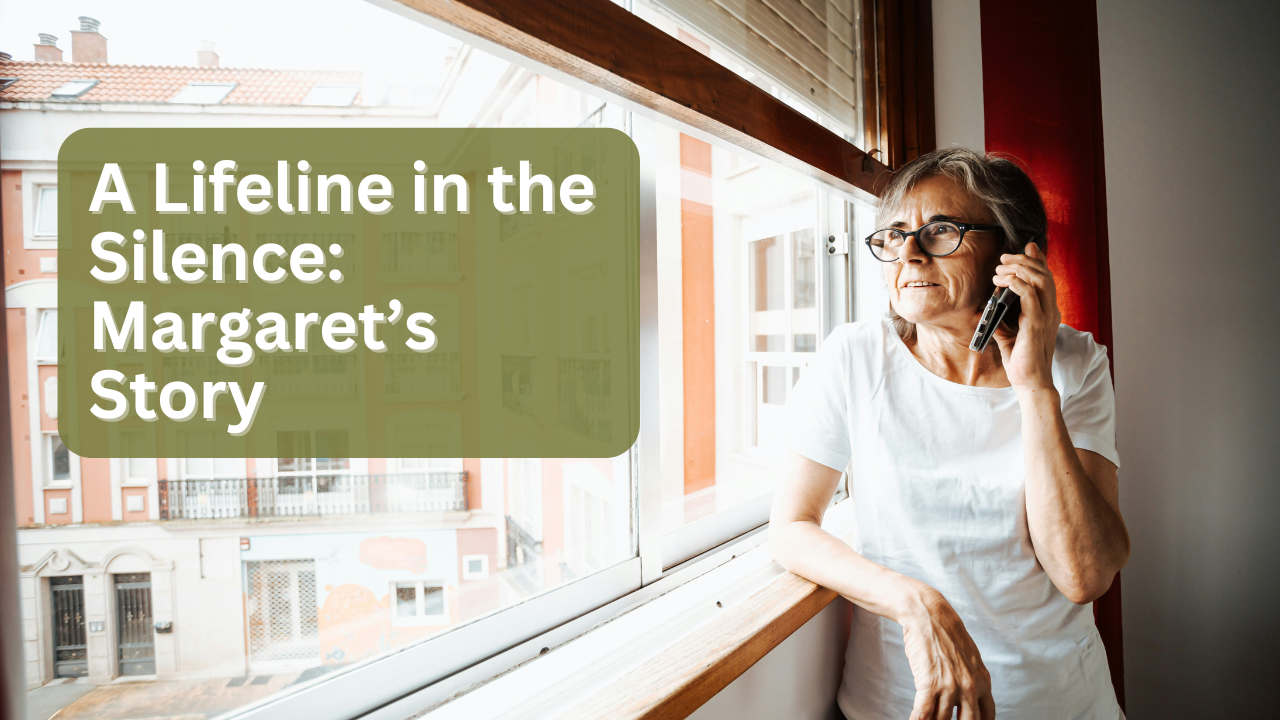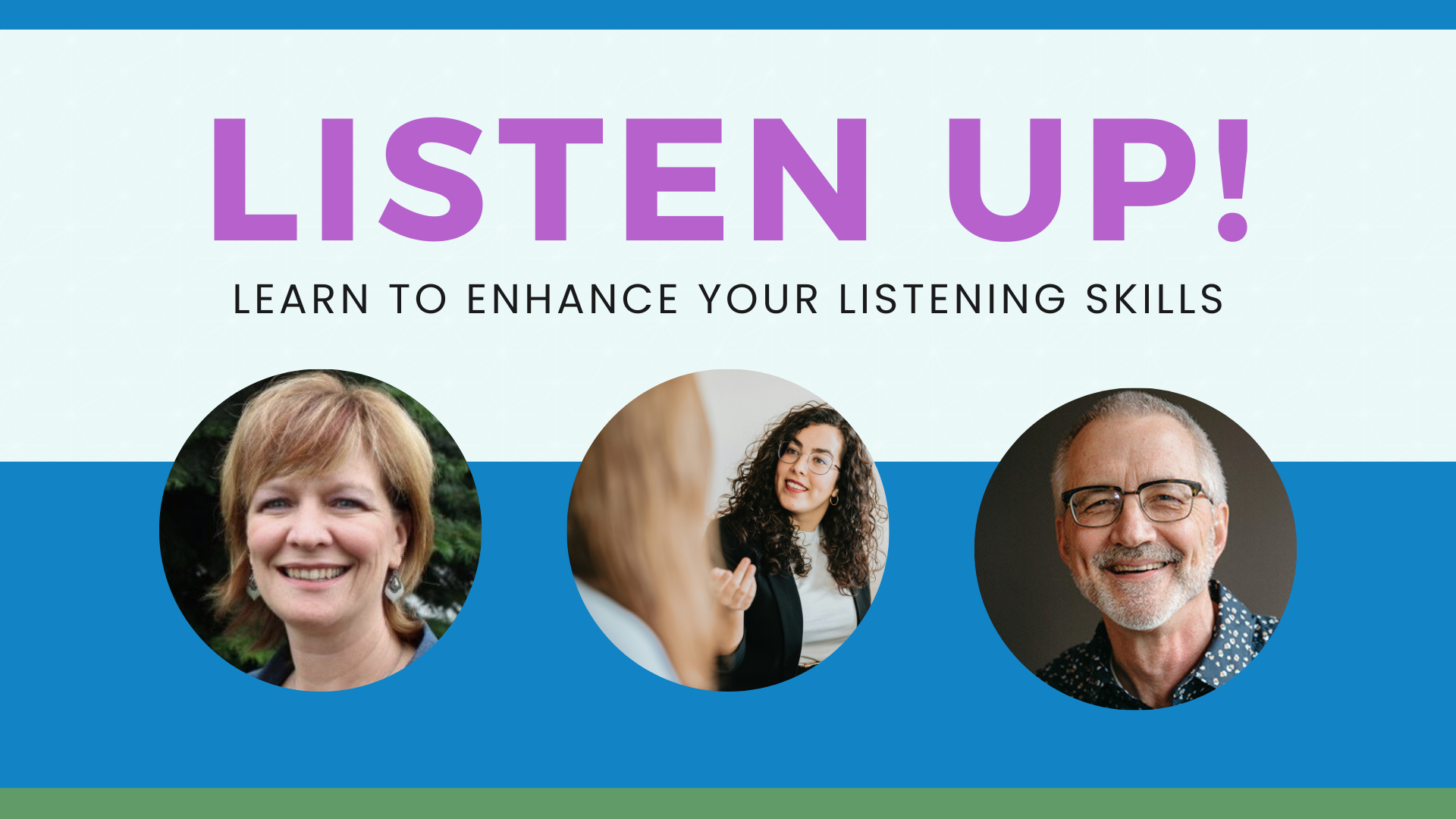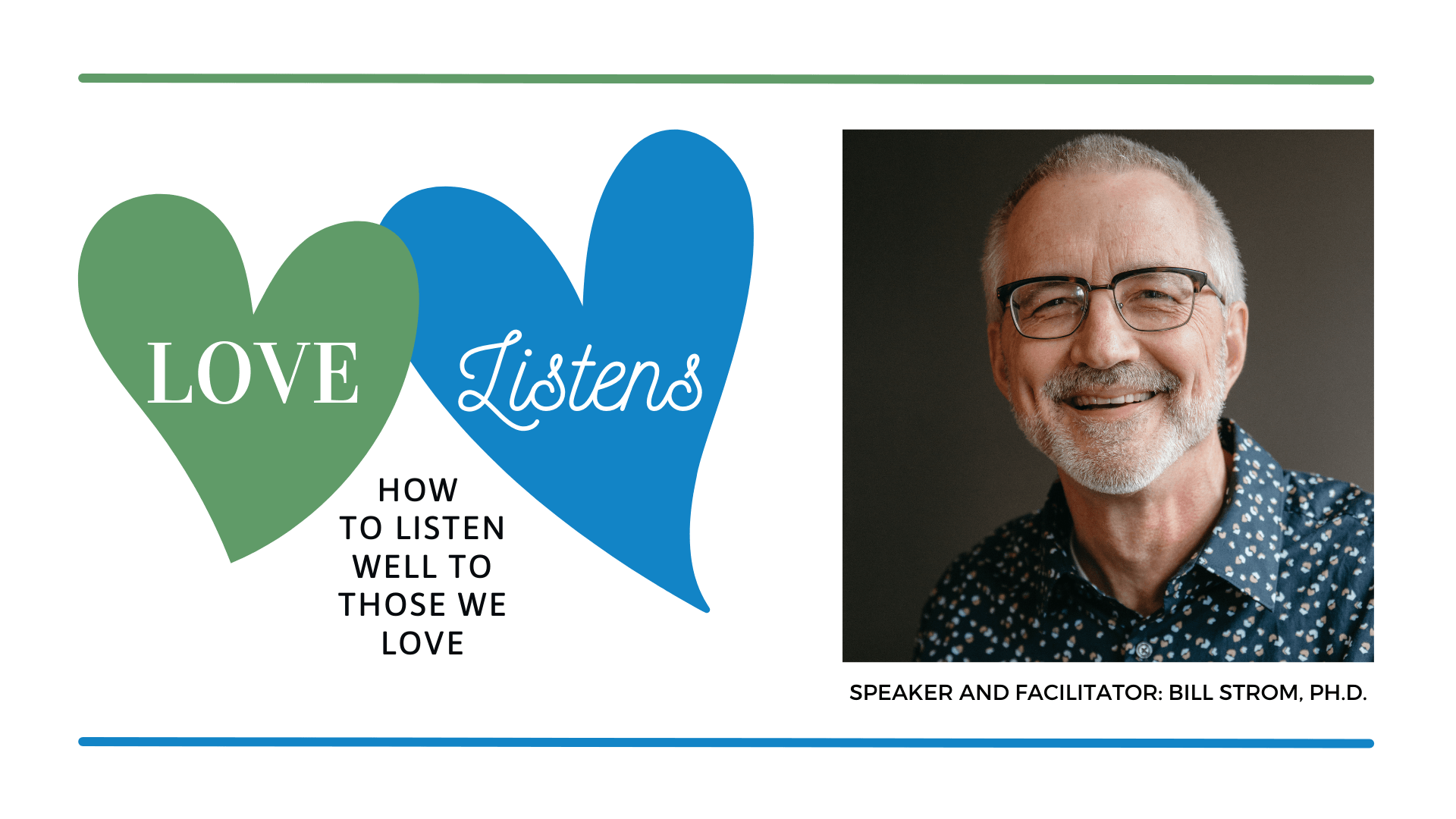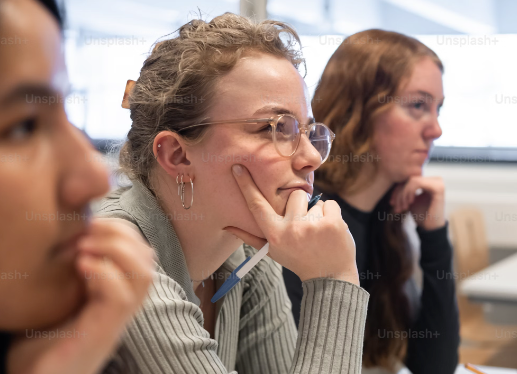PHONE FOR SUPPORT: 1-888-852-9099, 9 AM TO 9:00 PM, 7 DAYS A WEEK
LIVE CHAT: FRIDAYS AND SATURDAYS, 5 PM - 11 PM
Event Preview: Love Listens
How To Listen To Those We Love
With Dr. Bill Strom
(Rough Transcript)
What does Telecare do?
[00:00:00] Rod Janz: Provide us with a little background about Telecare. What do they do?
Bill Strom: Telecare is a non-profit here in Abbotsford with the goal of being available to listen to people who are hurting.
It began, back in 1989 with some churches that said there's a real need here to have a Christian crisis and call line, so a whole bunch of churches came together and they had about 50 volunteers who just went after it. This was pre-internet back when the phone was a real common way to reach out and people were lonely and loved to call a warm hearted, trained volunteer, who could listen, empathetically, and talk through options.
We’re not here to counsel people, we are not allowed to counsel. We are allowed to listen and to ask good questions and help people figure out what callers can do next.
We’ve been getting about 3000 calls a year from people who are just bummed about the economy, bummed about their houses, flooding with the most recent issues here locally, and a lot of people with mental health issues like depression, substance abuse, or have come from a home where as children, they treated just horribly.
We are a Christian organization. We like to see our volunteers being people who love Jesus passionately and want to serve him in this way. We find that the people who call can sense something's different.
Register for "Love Listens" - CLICK HERE
We don't proselytize. We do pray with people if they want to be prayed with, but we wait for them to ask if they would like to pray with us. We really don't want to be a school of theology or the Bible answer man. We're here to support hurting people, no matter what their background or what the problem.
The impact of COVID-19
[00:02:08] Rod Janz: How has COVID impacted things?
[00:02:10] Bill Strom: Well, a lot of people who were already maybe low on contact with the outside world now have that forced upon them. And so I think just the general uptick in the number of calls we had, like a 24, or 25% uptick in number of calls in 2020, and then it continued in 2021. It’s a general malaise that affects all of us, even who are generally well-functioning and experience issues of loneliness, of the disconnect, of not having a warm hearted person to talk to easily because of all the constraints on us.
People don't call to complain about the government, so calls are mostly about their own response to holding to the rules and trying their best to survive during a very unique time in the history of the world.
Love Listens - How To Listen To Those We Love
[00:03:11] Rod Janz: Great. Thanks for that. We wanted to get together to talk about this upcoming event and I will just, I'm going to just share the details here. The event is called Love Listens - How To Listen To Those We Love and you are the speaker and facilitator. The event is on February 17th at 7:00 PM. It's online and it's free or by donation so people can contribute if they like.
Caring Conversations
We could say this event is the third in a series, isn't it? We started this teaching series called Caring Conversations. I wonder if you care to comment on that?
[00:03:58] Bill Strom: Well, for a long time Telecare just did the service of listening to people online. And we obviously reached out to donors and the general public and churches to say, “Hey, can you support us financially?” And it was okay to make an ask for funding, but there wasn't any mutuality. There wasn't anything we really gave back to our donors and to the churches that support us. And, and so we thought, look, we have a lot to offer. What are we good at? We know we're good at caring for people, and we're really good at listening so one thing we first developed was Listen Up!, which is an on-site half day or full day workshop on active listening and how we can be better listeners. But then as COVID came around and we went online with the program and we thought, maybe we should do more than just a half hour online Zoom webinar. Let's, let's make it short and make it really powerful. An hour, hour and 15 minutes of conversation and bring people in who have something to say about caring for people and Q and just have a conversation about that topic.
Register for "Love Listens" - CLICK HERE
As a result in October of 2020, we had a great presentation on resilience. We had three speakers who were knowledgeable about the topic, both experientially and in research. I think we had a real good give and take during that event.
I guess in the big picture the idea is we want to bless people who are blessing us and we do that through information and wisdom and being thought leaders on the idea of listening as a way to help people heal. That’s what Caring Conversations is all about; helping the people who also are helping people. That's why we're really excited about February 17th.
What does it mean to be a faithful listener?
Bill Strom: Personally, I'll be I'm looking at what it means to be a faithful listener. You can take that as one who has faith, that is a Christian faith, but it also is the idea that if you're dependable, if you're loyal, you will be one who likely listens well.
I have an advantage because yes, I am executive director here at Telecare, but that's just about 10 hours a week. My other 35 hours is at Trinity Western University where I have been teaching in human communication for about 35 years. I've done research focused on close relationships and the communication that goes on between two people, married couples, best friends, romantic partners, and those kinds of close relationships. I've done some studies, read a lot and taught on the topic of how we get along with each other and how does communication and listening, especially play a role.
So that's the topic I'm going to discuss. It's going to be interactive. We're going to use a Zoom link. Periodically, if you are going to be a part of that presentation, you'll have opportunity to ask questions and we'll have time for a lot of Q and A, back and forth just as we want to do for any caring conversation.
Register for "Love Listens" - CLICK HERE
[00:07:52] Rod Janz: Well, I'm really excited about this because I know it's your area of expertise and you probably hear this a lot more than I do, but you in my conversations with people at Telecare, who've been trained to listen by Telecare that it has made a real difference in their lives and I feel like this event is going to give people a bit of a taste of that and give them some of the skills that we provide our call responders.
[00:08:32] Bill Strom: I hope all the people who volunteer with us can attend and get a shot in the arm about the kind of skills and values that we encourage at Telecare. Other people will benefit from this event are counselors, pastors, and anybody who works with people for work. We really hope that the seminar can be insightful, but also practical providing a good balance between the two. That’s our goal.
[00:09:04] Rod Janz: Why is listening such an important subject?
[00:09:08] Bill Strom: Great question and the answer is because the fact that listening is important is lost on us at times. So often people think that all the have to do to listen point their head towards someone, or their ears, and pick up the sound of their voice and that’s it. This is just the beginning of really listening.
Right now, there are challenges to the simple act of listening effectively. Imagine this: How many times do you pick up your phone a day? How often do you watch a movie, film, or video online in the evening? How much time do you spend on your computer? Research shows that on average we are on a screen about 10 hours a day. You might think it's all because of those young folks on their phones, but do you know that while they do use their phones more than maybe those of us who are older, adults in Canada on average are in front of screens 13 hours a day.
We have a choice when it comes to digital screens. We can give them our full attention, or we can ignore them. When we ignore them, they don't get mad at us. In fact, we have total control and that's a good thing if we're into entertainment, but a bad thing if it's taking away time with and engaging people face-to-face.
Add to this another disturbing finding about the empathy index which is taken annually is on the decline due to screen time. Empathy being the ability to understand someone else's emotions or at least their perspective as they say something.
Also, the number of close friends index just dropped below two for the first time. When the index started being taken the friend index was 2.1 and now it has dropped to 1.9. The joke is, of course, I would hate to be that 0.9 of a friend.
It's disheartening that we are not able to enter other people's emotional world. And that we are also having fewer friends with whom we could enter their world. So, number one, we're losing the art of conversation. And number two, we're losing the art of listening well in those conversations. That's why I really hope to share some ideas and research emphasizing the importance of listening well and what good it can do for our closest relationships.
[00:12:23] Rod Janz: Excellent. Thank you.
Bill, can you just give us a brief outline of what you'll be talking about on the 17th?
00:12:29] Bill Strom: Sure. I'm going to start with three scenarios of a person looking to talk with someone about an issue she's going through.
The three scenarios include three friends and how they respond to her in quite different ways. I think you'll find yourself in one of those three styles of how you relate to people and that's the springboard into the rest of the talk. We really want to drill into active empathetic listening. That's the key term today for what we do at Telecare. We're going to unpack that a little bit and while active empathetic listening is our goal there are all kinds of barriers to doing it. Yes, there is our digital environment we live in, but there are so many personal issues we encounter too that we’ll discuss.
Near the end, we will go through some steps on how to listen well, the practical things that are necessary to set up a good conversation, and then I am going to share some of my own research.
In my research I asked and answered the question, “what is it about a person that makes them more likely to be an active, empathetic listener? Is it your personality? Is it your moral heart? Is it your attitude? Because we know some people just don't like talking or listening to. So, maybe it's a bad attitude, and I look at these and have some research that I think you will find interesting.
We won't be getting into statistics and all that. We’ll just discuss some findings that I think people will find very interesting and hopefully motivating for us to listen better.
Register Today!
[00:14:39] Rod Janz: If people want to find out more, they can go to our website, which is telecarebc.com and we have put information about the Love Listens event on the homepage. You'll see a button there that you can click on and get more information. And if you're interested in attending and we, obviously love to see you there. , We’re really excited and love this topic. So we hope that you can join us on February 17th.
Need Someone to Listen?
Remember, you're not alone on this journey. If you're seeking a compassionate ear and a heart that understands, we encourage you to call us. Support is just a phone call away. See below for information on how to connect with us.
Discover Hope in Every Email
Join our community for uplifting stories, expert advice, and a path to healing.
Get the support you need
For Crisis or Emotional Support Call:
- 604-852-9099 in Abbotsford and Mission
- 1-888-852-9099 toll free throughout British Columbia
- If you are in a life threatening crisis, please call 911
Recent Posts
> End your Anxiety: A Prayerful Approach
> Renew your Strength – God's Promise to You
> Bible Verses that Help When You're Afraid | Telecare












